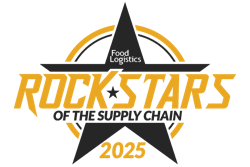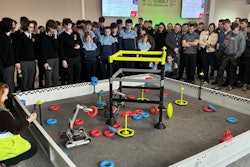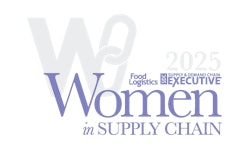
The temperature-controlled logistics industry offers a fulfilling and varied career for young professionals. It is a fast-paced, innovative and indispensable industry that supports careers across a range of specialisms such as refrigeration engineering, logistics management, sustainability, data analysis, IT, accountancy, business development and HR as well as broader roles in operations and general management. As an industry that is constantly evolving, opportunities are also developing for careers in areas such as automation, renewable energy, AI, and research.
The Cold Chain Institute, run by Global Cold Chain Alliances (GCCA’s) research and education arm the Global Cold Chain Foundation, provides professionals in temperature-controlled logistics with a unique opportunity to build the skillset that supports careers in the cold chain.
For young professionals, the Cold Chain Institute provides a great opportunity to enhance their individual specialty whilst developing the 360-degree understanding of the temperature-sensitive industry. With modules taught by recognized industry leaders, it is also a fantastic way to learn from the best while building strong relationships with faculty members and fellow students.
The Institute has also expanded globally, serving students in not only the United States, but also Europe, Australia, Brazil, and Latin America.
There are a number of skill areas taught at Cold Chain Institute that are particularly valuable for career readiness for young professionals.
360-degree knowledge of cold chain operations, efficiency and compliance
The basis of readiness for a career in the cold chain is a comprehensive understanding of temperature-controlled logistics operations, operational efficiency, and compliance.
Over the three years of the course, students at the Institute learn the essentials of warehouse operation; best practice for food tempering, chilling and freezing; food safety in the warehouse and in transportation; and analysis of refrigeration systems and energy usage. Institute students also learn about the relevant regulations and strategies for compliance with regulations affecting the cold chain, and are taught about job safety, safety training for employees, and preparing for OSHA inspections. These are some of the fundamental knowledge areas on which to build a career in the cold chain.
Temperature-controlled logistics business development
Learning business development skills specific to temperature-controlled logistics not only opens up specialist career opportunities within the industry for young professionals, but this knowledge also provides essential context for roles across a temperature-controlled logistics firm.
Students at the Institute learn how to deliver the excellent customer service that is essential to the maintenance and growth of a cold chain business’ customer base. This includes a focus on preventing and resolving customer conflict, and examination of building strong relationships between carriers and warehouse partners.
Other key business development skills included in the Institute’s curriculum include practical strategies for protecting and improving sales margins, construction of business agreements that are mutually agreeable to all parties, and learning how to deliver effective presentations. These skills and experiences are a great asset for young professionals seeking to develop their career in the cold chain.
Cold chain leadership and management
For young professionals building a career in temperature-controlled logistics, leadership and management skills specific to the unique challenges and opportunities of the industry are invaluable. As part of the Cold Chain Institute program, students learn from some of the most inspiring and experienced leaders in the industry. The course explores how to apply strengths and personalized strategies in cold chain leadership, and how to adapt personal style for collaborative, interdependent, and supportive teams. Successful communication is crucial in business leadership, which is why the Cold Chain Institute’s instruction includes modules exploring excellence in communicating through writing and public speaking.
Another important cold chain leadership skill is the ability to successfully inspire and manage people. Key aspects examined at the Institute include interviewing candidates, managing and motivating people for best performance, and learning techniques for delivering employee-specific feedback and coaching.
Students at the Institute also learn wider management skills including budgeting and financial controls, identifying opportunities to control expenses and increase profits within an operation, utilizing a cost-benefit analysis, and creating a business plan for capital expenditures.
Resilience and problem-solving in the cold chain
Temperature-controlled logistics is among the most adept and experienced industries in finding creative and fast solutions to new challenges, both in day-to-day operations and also at the macro industry level. The ability to solve problems and overcome challenges is often crucial for developing a career in the cold chain.
Skill areas taught at Cold Chain Institute include emergency response planning and crisis management specific to temperature-controlled logistics, as well as risk management for warehouse exposures and security threats for refrigerated warehouses and transportation. The course focuses on a number of example scenarios including a customer recall simulation, and development of strategies to identify and prevent cyberattacks.
Students also hear from leading experts on preventing and solving challenges related to staffing including change management, managing labor relations in cold supply chains including conflict resolution and workforce engagement, and understanding employment practices and liabilities.
Additional professional training opportunities
For young professionals developing careers specifically in the design, construction, maintenance, safety, and long-term operations of controlled environment facilities, the Controlled Environment Building Association (CEBA) Professional Certificate & Training Program creates an invaluable opportunity to develop workforce expertise while also expanding their professional network and achieving differentiated recognition. Students who complete the three-day immersive training program and pass the assessment exam are recognized by CEBA with a certificate and included in the CEBA Professional Certificate Program website directory.
Preparing for the cold chain of the future
The cold chain is in a time of significant change included substantial industry growth, new regulations, and the application of new and emerging technologies. Young professionals developing a career in the cold chain should look to the future of the industry and consider the knowledge and skills that will help them take a leading role in navigating the industry towards its exciting future.
At Cold Chain Institute, students consider how the international cold chain is evolving, analyzing the impact of government agencies on international business and discussing how different factors may impact national and international cold chains over the years ahead. They learn from the experts about current and emerging technological trends in temperature-controlled logistics operations, and about considering cost-effective technologies that improve productivity and efficiency, as well as discussing innovations, technologies and trends throughout the modules of the course.
Temperature-controlled logistics is an exciting industry in which to work, full of great potential for career development in a variety of specialist and generalist roles. The knowledge, skills and experience needed for each different cold chain role is unique, however enhancing these skill areas will set a young professional in very good stead, every step of the way.



















